Spy News Magazine: What has changed since you won the Oscar?
Mark Mangini: It’s funny. I was just thinking about that this morning. What has changed is my confidence in myself. I’ve wanted to win an Oscar for so long, so I felt like that was going to be some kind of validation of my work. I feel like for 40 years I’ve been trying too hard, and now I feel like I don’t have anything to prove. It actually is a very freeing thing. It will allow me to be a better artist because I don’t have to try so hard. I can just be. I can just do my thing. I always try hard, but this has taken the pressure off. I don’t have to prove anything to anybody.
Spy News Magazine: How did you feel the first week after winning?
Mark Mangini: It’s kind of like the way I felt the first week after getting married. You’re just as happy as you’ve ever been. It just feels like you have not a care in the world. Anything that was bothering you just disappears. All your anxiety disappears because you feel like one of the great winners of the world. It’s hard to explain. I’m sure we’ve all felt that, like when you ask a girl out on a date and she says yes, or when you get that big job, or you buy your first car. I don’t know. It’s just a great feeling.

Spy News Magazine: What was your first thought when you won the Oscar?
Mark Mangini: I didn’t believe it. This is my fourth nomination, and when I heard my name I thought, “I’m dreaming this. He really said the other movie.” It was really disbelief more than anything else. Then that was just for a split second because I thought my brain might have been playing tricks on me. Then my wife got up and kissed me and screamed out loud.
I was so petrified about forgetting my speech because I had memorized it. I think it’s boring when you look at the script you wrote for yourself and you’re not looking at the world.
Spy News Magazine: If you could equate it to a sound what would it be?
Mark Mangini: It’s like the clouds opened up and the angels sang! You know, that choral “Ahhhhhhh”
Mark Mangini, Dylan Sprayberry, Ann Mangini and Rio Mangini
Spy News Magazine: How late were you up the night you won the Oscar?
Mark Mangini: We could have stayed out later, but I had to work the next day, although I ended up not working. The director I’m working for said, “Take the day off. It’s a great day for you.” We went to bed at 4am. We went to the Vanity Fair party. On our way home somebody invited us to the Madonna party, and I’m thinking, “4am? How long does that party go?”
Spy News Magazine: What did you do the next day?
Mark Mangini: The next day we slept a little late, and then we went to meet all our Australian associates and the rest of the Mad Max nominees and winners. Mad Max won a lot of awards. We won six awards that night. We’re a real family, and we all met at a hotel in Beverly Hills. Then we went to Hollywood together with all our Oscars and we were interviewed live on Australian television as a group and with George Miller, which was really lovely. It was a nice way to remember the movie and remember each other. We also went out and had lunch at Bouchon in Beverly Hills.
Then I spent a lot of time returning phone calls. So many people have called me to congratulate me. I spent a lot of time returning emails and texts because my phone exploded with emails, hundreds and hundreds of congratulations from around the world, really, some whom I hadn’t spoken to in 40 years.
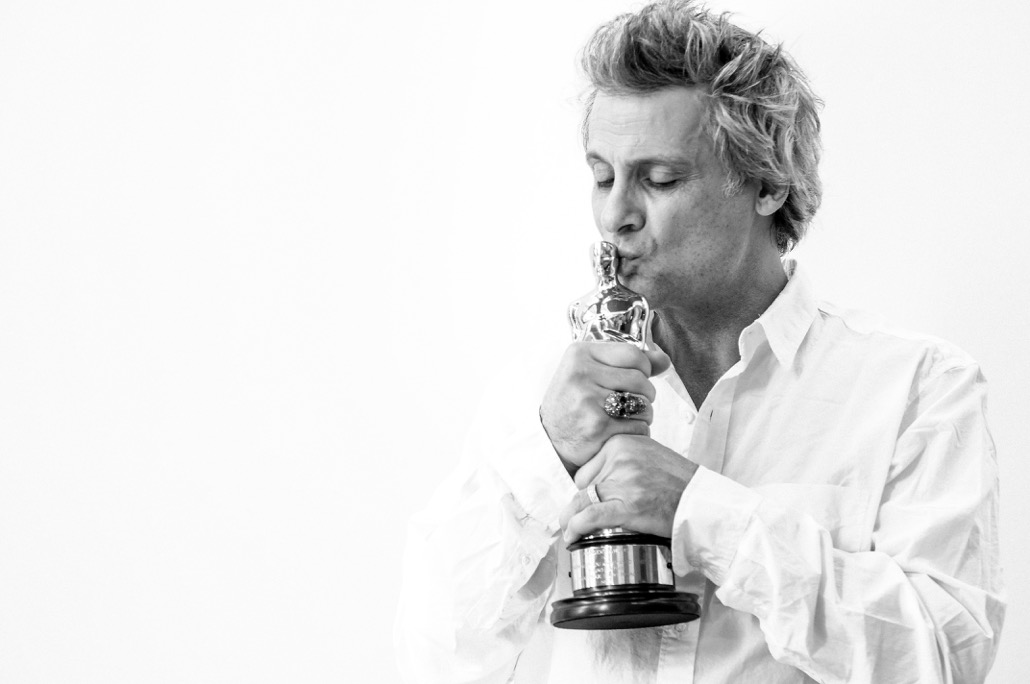
Spy News Magazine: What was your biggest challenge while creating the sound effects for Mad Max?
Mark Mangini: I’ve been asked this question a lot, and I always draw a blank because George Miller is such a creative and collaborative filmmaker, It always felt easy. I never felt a challenge at least in the sense that there was something I couldn’t accomplish. It was hard work. We worked on the film for seven months. If there was a biggest challenge, and it wasn’t much of a challenge it was this: At the beginning and end of the film we’re in an area called “The Citadel,” where Immortan Joe comes out and tells the people, “Don’t be addicted to water,” and there’s 50,000 people listening to him. Of course you don’t shoot with 50,000 people. You shoot with 100 people, and then in digital effects you add 49,000 more. We had to make it sound like 50,000 people chanting his name. They’re chanting, “Immortan Joe, Immortan Joe,” like that. I had to create the sound of 50,000 doing that, so that took a long time. We tried all sorts of crazy electronic versions of it. In the end, the solution was I had a friend, Chris Ward go to a rugby match in Wellington, New Zealand. He’s a good friend of mine who worked on The Lord of the Rings movies and had done this before. The rugby team owners gave us five minutes before their game, and allowed him to direct the crowd. There were 50,000 people in the stadium at this rugby match. I don’t remember the name of the rugby team. He had a bullhorn, and he said, “Okay, I want you all to chant ‘Immortan Joe, ‘Immortan Joe.'” He got 50,000 people to do that. He had a sound recorder, brought it back, and we put it in the movie.
Spy News Magazine: Where do you find your inspiration for sound effect and in life?
Mark Mangini: The inspiration for sound effects is pretty easy. I like to think that sound effects can tell part of the story just like the words and the performances do, so I read a script in the same way that an actor does, and I look for subtext and back-story. Once I understand what the motivations are in a scene, what the director is trying to achieve in a scene, then it’s just a much more direct leap to, “These are the sounds that help tell that story.” You’re looking for those beats. Every minute of the film you’re looking for what the storyteller, what the director is trying to say, and then you just imagine, “Here’s the kinds of sounds that will help tell that moment. This is a scary sound. This is an exciting sound. This is the sound we want the character to hear,” even though you wouldn’t really hear it in reality.
Mad Max is a really noisy movie, or it should be a noisy movie. There’s so much going on at every moment. There are engine sounds of trucks and cars, and there are guns, and there are explosions, and there’s shouting and screaming, and there’s actors talking. At any given moment you could be hearing a lot of sound. In reality, it would be a mess.
It would be chaos. You couldn’t focus, but in movies you always have to have focus, and of course we have control. My job is to define the focus. What is the one thing we should be listening to? That tells the story. In terms of where I find inspiration in life I think because I’m an Italian and I have a deep Italian heritage, I’m kind of like a little Geppetto, you know, the guy who made Pinocchio?
I’m a craftsman. I want to work with my hands and make something beautiful. My inspiration is simply work hard; do something great; take some chances. Hopefully at the end of the day you have something really beautiful to share with the world that you can be proud of. It’s as simple as that; Do something great.
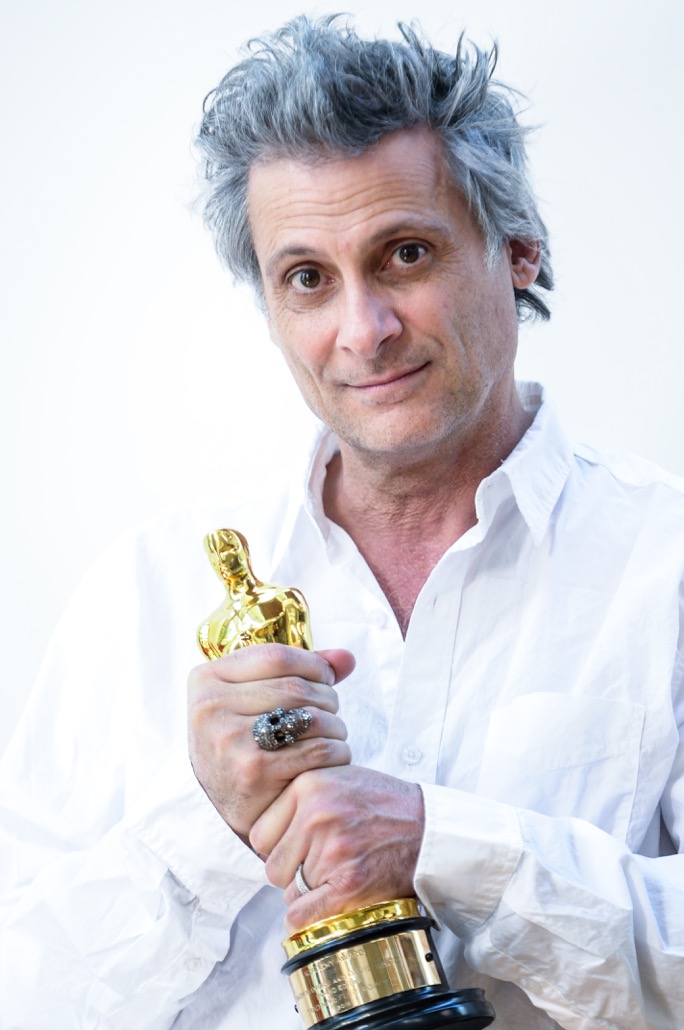
Spy News Magazine: We always think of sound effect engineers to be walking in a forest or on a beach recording sounds of bird, wave, door slamming, et cetera. Now the technology is so advanced, how do you create your unique sound?
Mark Mangini: Nothing has really changed. The secret is that the best sound still begins life as real recordings, and there’s a psychological reason for that and there are psychoacoustic reasons. Remember that the goal of a film is for the audience to suspend disbelief. A movie is make-believe, but we want you, the audience member to believe that it really happened. The way to do that is to trick the brain into thinking it’s seeing and hearing things that are believable.
When you use synthetic, or non-acoustic sound manufactured, or sound created from a computer, the brain immediately interprets it as false, and so you undercut your purpose. The best sound starts life as something you recorded acoustically because the ear hears real sound as believable. You don’t think this; it happens all subconsciously, actually. Even if I’m creating the sound of something that doesn’t exist in reality, I start with real sounds because you’re already 50% of the way there in tricking the audience into believing this is something that could really exist.
We always start life by recording lots of raw elements, and sometimes those raw elements are very much like the thing that we want to create the sound for. For example, in Mad Max, though we created the truck that Furiosa drives, it’s called “The War Rig,” we used real diesel engine trucks as the basis for that. It’s also a metaphor for a whale because the allegory was Moby Dick, the famous novel. I saw it as the great white whale, so I recorded whale sounds and added it to truck sounds to give it this other non-literal and literary dimension and also to make it slightly different than just … It’s something more than just a truck; it’s the nemesis of the antagonist, who would be Ahab.
Spy News Magazine: We know that many times you must be creative with sounds for creatures and machines that don’t exist in our reality. How do you translate that to the screen? What was your favorite sound that you’ve created?
Mark Mangini: Oh man, there’s so many. I get hired because of my imagination, and I do a lot of films where I have to create things that don’t exist. Much like a painter or a songwriter I don’t know where the inspiration comes. I watch the film and I just try to … I just wait for the inspiration.
Where did the inspiration for Keith Richards to write “Satisfaction” come from? It just occurred. It just comes from nowhere. We don’t know where the inspiration comes from. My process is one of immersing myself in the story and the script and working with the director to understand what they want. Then I wait. Sometimes it’s just hard work. Sometimes I’ll sit in my sound library and just listen to things, and I’ll wait for inspiration. Sometimes I’ll look at movies that have a similar theme or idea and see if it gives me some inspiration. I don’t know where those ideas come from. Sometimes you need to look for those metaphors. Like I said earlier with the truck in …Mad Max, and the whale, I saw it as this allegory, so that was an easy one.
I sit with the director a lot and we talk at length about what he wants to do, so sometimes if he gives me an idea of what he’s trying to do dramatically that gives me a place to begin looking for sounds.
As for my favorite sound, I don’t know if I have a favorite because I love every movie that I’ve worked on. I’d probably say I have a real fondness for the gremlins voices in the movie Gremlins. That’s a long time ago. When we were trying to make the scary gremlins sounds, the evil gremlins, I had heard … I was going through my library and I had heard the sound of these dogs called “pit bulls.” They make this really expressive, gargly, growling sound, and it just sounded vicious, and it didn’t sound like a dog. I heard a very brief sample of it, so I went on an expedition to record a lot more of these dogs making these growling sounds.
They’re actually beautiful, friendly, fun dogs, but we brought these dogs into the studio and recorded them making all sorts of sounds. Those were the beginnings of the sounds of the scary gremlins. The sounds of the cute gremlins were a combination of actors’ voices and my son Matthew who had just been born. He was only six or seven months old. He made all these really cute little cooing noises and giggling noises, so I used those as part of the sound.
It was just fun to create a creature, a gremlin that no one had ever heard before from scratch, and the director, Joe Dante, was very generous in allowing me to invent it. He didn’t tell me what to do. “Create it,” so I just got to use my imagination.
I used these sounds of my newborn son because we wanted the cute furry Gremlins to be adorable, so my first thought was, “Babies: Everybody loves a baby. Let’s make them cuddly and cute.” Then the evil gremlins were a mixture of these dog sounds
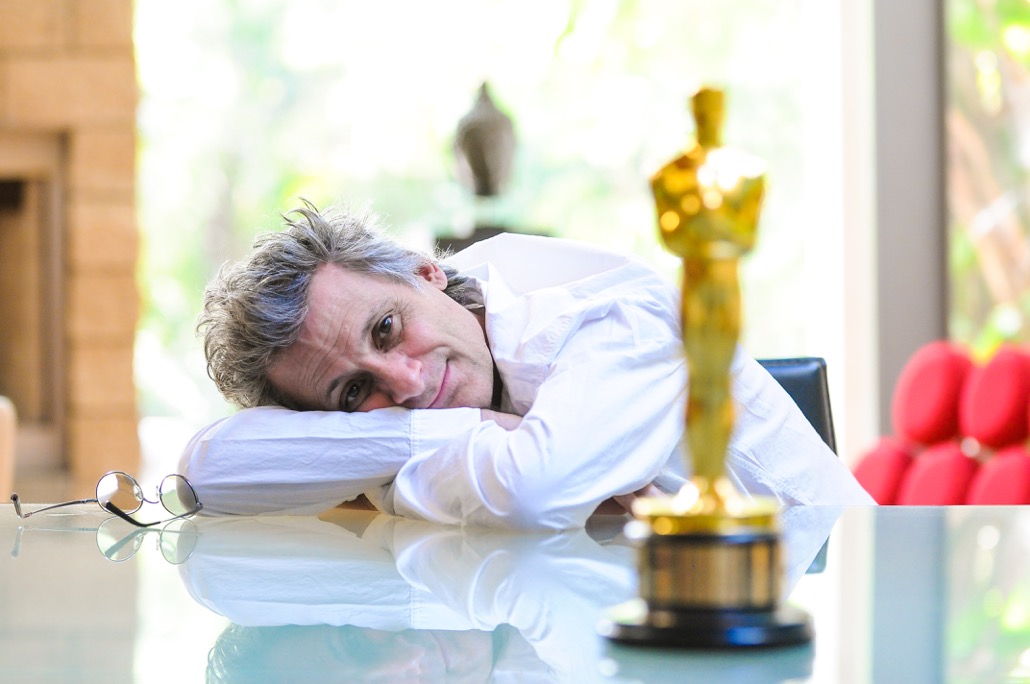
Spy News Magazine: What are your upcoming projects, if you have any?
Mark Mangini: I just finished a really, really great suspense thriller called “The Accountant” that stars Ben Affleck, J.K. Simmons, and Anna Kendrick, and was directed by my good friend Gavin O’Connor. The day after the Oscars I started a new movie called “Fist Fight.” It’s a hysterically funny comedy with Ice Cube and Charlie Day. You’ll laugh. It’s going to be great. I think it comes out at the end of the year.
Then I’m doing a documentary about Kobe Bryant, the very famous basketball player for the Lakers. We’re following him around as he’s announced his retirement, and it’s a cinéma vérité look at his current career. It’s not meant as a hero worship documentary. It’s meant to just see what it’s like to be one of the greatest athletes in the world and what it’s like for him to be retiring after 20 years in the NBA I’m really excited about that project.
Spy News Magazine: Is there a movie you would love to work on next?
Mark Mangini: One of my favorite films of all time is Forbidden Planet. It was made I think the year I was born, in 1956 or maybe ’57. It is a great science fiction story and it still holds up to this day. One of the exciting things about it is that the entire soundtrack for the film, what we might call “music” and “sound effects,” were all done by a husband and wife team, Bebe and Louis Barron. The beauty of it is that there is no way to tell which are the sound effects and which the music. It’s all just one seamless track of electronic sounds; I don’t even know what to call it electronica.
They created everything from these analogue tube circuits, and you don’t know which is which. It’s just the sound that makes the movie, and it’s an extraordinary accomplishment, and I would love to do something like that because I am a composer, and a musician, and a sound designer. I’d love to be given that opportunity to create everything you hear from one person. Most films have a composer who writes the music and a sound designer who does all the other sounds. If you do it with one person I think there would be this beautiful, seamless synergy of just one person’s idea. I want to do that.
Spy News Magazine: If the Oscar could make a sound, what would it be?
Mark Mangini: “If Oscar could make a sound, what would it be?” Oh boy, oh gosh, that’s a good question for a sound designer. I would suppose Oscar would want to speak because Oscar is idealized and greatly misunderstood all at the same time, so I think Oscar would want to give his own speech some day, and tell the world what he really thinks. He would sound really distinguished, like a Gregory Peck-like actor.
Spy News Magazine: What is your favorite silent film?
Mark Mangini: Ooh, that’s a really good question. Let me think about that for a second.
Because I know I have one, and it’s just escaping me for a second. I can’t think of one. I don’t think I have one. I don’t watch a lot of silent films, and I’m not that kind of film fan … I wish I were. I have friends who are really cineastes that they consume; they spend their lives-watching cinema in silent film festivals and old movie festivals. I’ve never been that kind of filmmaker. I’m must more of a modernist that way. I can’t think of one. You’ve really stumped me, and I should because when I get a film like Mad Max there is not a lot of sound in it when I receive them. I do the kinds of films that are very visual effects heavy that never started life with sound to begin with.
I love this idea that the audience fills in the soundtrack in their head in silent films, and that’s what I do when I watch a film, when I’m given one.
There’s a beauty to everyone’s imagination; having a different conception of what they hear. That’s part of my process when I get a film; I try to imagine what would move an audience. I want to achieve a soundtrack that is exactly what the audience thought that it should or would sound like, even if whatever it were that the audience is listening to never had any sound to begin with, like Gremlins. If you believed that those gremlins were real, hopefully because of the sound that I made, because of course they were just latex puppets, then I’ve done my job. I’ve fulfilled your fantasy of what you thought you should have heard.
It doesn’t directly answer your question about my favorite silent film but it’s the best I can do for having just won an Oscar and not being able to remember my own name!
Interview & photo: Rachid Ait
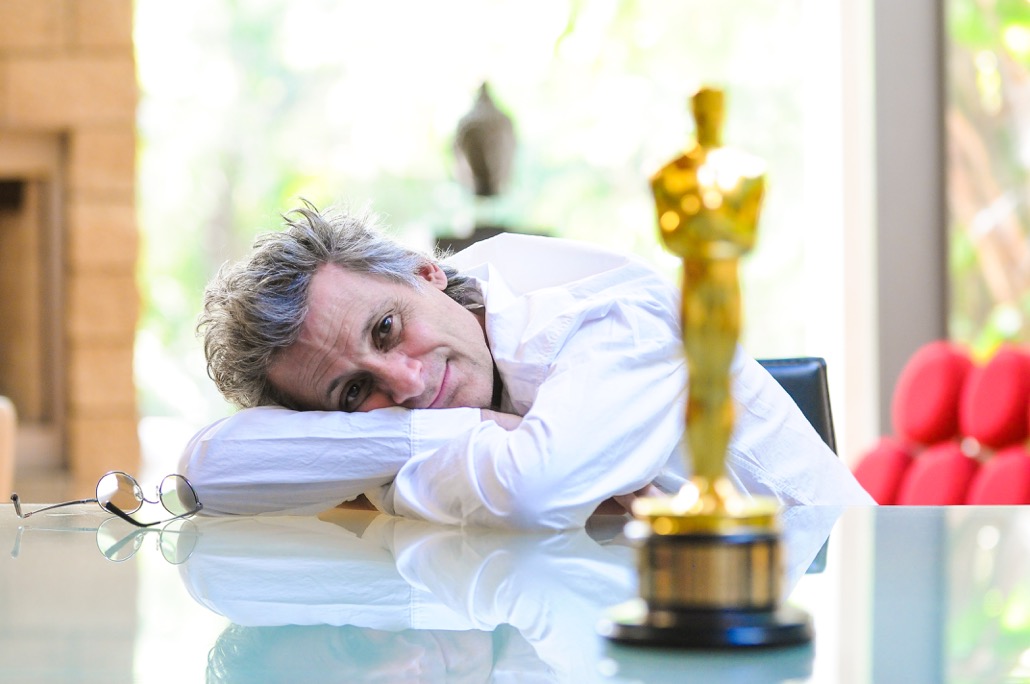
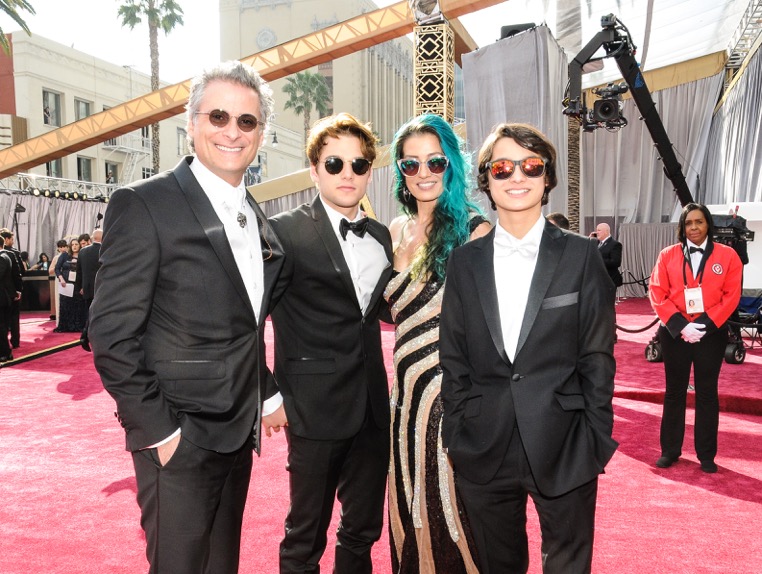



more pix man next time! Great interview!))))
I saw him on the ceremony getting it! #cool
love it!!!
неплохое интервью реально все то что меня интересовало бы как читателя! правда фото хотелось бы немного больше! и фото его дома наверно ))))
Great questions and I really enjoyed Mark’s responses. Really great interview!